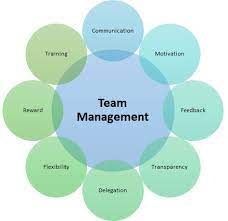Leadership: Inspiring Others to Achieve Greatness
Leadership is an essential element in every aspect of life, whether it be in business, politics, or personal relationships. It is the ability to guide and inspire others towards a common goal, harnessing their potential and helping them achieve greatness. A true leader possesses a unique set of qualities that enable them to make a positive impact on those they lead.
First and foremost, leadership requires vision. A leader must have a clear understanding of where they want to go and the ability to articulate this vision to others. By painting a compelling picture of the future, leaders inspire their team members to believe in the possibilities and work towards achieving them.
Another crucial aspect of leadership is effective communication. Leaders must be able to convey their ideas, expectations, and feedback clearly and concisely. By fostering open lines of communication, leaders create an environment where ideas can flow freely, collaboration can thrive, and individuals feel valued.
Furthermore, leaders must possess strong emotional intelligence. They understand the importance of empathy and actively listen to their team members’ concerns and perspectives. By showing genuine care for the well-being of their team members, leaders build trust and foster a positive working environment.
In addition to these qualities, a leader must also demonstrate integrity. They act with honesty and transparency, leading by example and setting high ethical standards for others to follow. Trust is the foundation upon which successful teams are built, and integrity plays a pivotal role in establishing that trust.
Leadership also involves empowering others. Great leaders recognize the strengths of their team members and provide them with opportunities for growth and development. They delegate responsibilities effectively, allowing individuals to take ownership of their work while providing guidance when needed.
Moreover, adaptability is key for effective leadership. In today’s rapidly changing world, leaders must be able to navigate uncertainty with confidence. They embrace change as an opportunity for growth rather than resisting it, inspiring their team members to do the same.
A leader’s impact goes beyond achieving immediate goals; it extends to developing future leaders. By mentoring and coaching individuals, leaders invest in the growth of their team members, empowering them to become leaders themselves. This creates a ripple effect of positive influence that can shape organizations and communities for years to come.
In conclusion, leadership is not just about holding a position of authority; it is about inspiring others to reach their full potential. A great leader possesses vision, effective communication skills, emotional intelligence, integrity, empowerment, adaptability, and a commitment to developing future leaders. By embodying these qualities, leaders create an environment where individuals can thrive and collectively achieve greatness. So let us strive to be the kind of leaders who inspire others and make a positive impact on the world around us.
9 Frequently Asked Questions About Leadership: A Comprehensive Guide for UK Readers
- What is leadership and why is it important?
- What are the key qualities and characteristics of a good leader?
- How can I develop my leadership skills?
- What is the difference between leadership and management?
- How can I effectively motivate and inspire my team members?
- How do leaders handle conflicts and difficult situations within a team?
- What strategies can leaders use to promote collaboration and teamwork?
- How can leaders adapt their leadership style to different situations or individuals?
- Are there any recommended books or resources for learning about leadership?
What is leadership and why is it important?
Leadership is the ability to guide, inspire, and influence others towards a common goal or vision. It involves taking charge, making decisions, and motivating individuals or teams to achieve their best potential. Leadership is not limited to a specific role or position; it can be exhibited by anyone who takes initiative and inspires others to follow.
Leadership is important for several reasons:
- Direction and Vision: Leaders provide a sense of direction by setting goals and creating a vision for the future. They help individuals or teams understand where they are heading and why their efforts matter. A clear vision inspires people to work towards a common purpose.
- Motivation and Inspiration: Effective leaders motivate others by creating an environment that encourages growth, recognizes achievements, and supports personal development. They inspire individuals to go beyond their limits, fostering a sense of enthusiasm and dedication within the team.
- Decision-making: Leaders are responsible for making decisions that impact the success of an organization or team. They analyze information, consider different perspectives, and choose the best course of action. Strong leadership ensures timely decision-making that aligns with organizational goals.
- Building Relationships: Leaders understand the importance of building positive relationships with team members, colleagues, stakeholders, and customers. They foster trust, open communication channels, and create an inclusive environment where everyone feels valued and respected.
- Problem-solving: Leaders are adept at identifying challenges or obstacles that may arise during the pursuit of goals. They encourage innovative thinking and guide individuals in finding solutions to problems while maintaining focus on the overall objective.
- Development of Others: Leadership involves nurturing talent within the team by providing guidance, feedback, mentoring, and opportunities for growth. Effective leaders invest in developing their team members’ skills and abilities, empowering them to take on new challenges.
- Organizational Success: Strong leadership is crucial for achieving organizational success. It sets the tone for productivity, efficiency, collaboration, innovation, and adaptability within a team or company. Effective leaders create a positive culture that attracts and retains talented individuals, leading to improved performance and sustainable growth.
- Influence and Impact: Leaders have the power to influence others’ thoughts, behaviors, and actions. They can inspire change, rally support for causes, and make a positive impact on individuals, communities, or society as a whole.
In summary, leadership plays a vital role in guiding individuals or teams towards shared goals, fostering motivation, making effective decisions, building relationships, solving problems, developing others’ potential, driving organizational success, and creating a lasting impact. It is an essential element in achieving personal growth, team success, and the overall progress of organizations and communities.
What are the key qualities and characteristics of a good leader?
A good leader possesses a unique combination of qualities and characteristics that set them apart. Here are some key qualities that define a good leader:
- Visionary: A good leader has a clear vision and can articulate it to others. They inspire and motivate their team by painting a compelling picture of the future.
- Effective Communication: Leaders excel in communication, both in conveying their ideas and actively listening to others. They ensure that information flows freely, ideas are understood, and feedback is given constructively.
- Emotional Intelligence: Good leaders have high emotional intelligence. They understand and manage their own emotions while empathizing with others. This allows them to build strong relationships based on trust, respect, and understanding.
- Integrity: Leaders act with honesty, transparency, and integrity. They lead by example, setting high ethical standards for themselves and their team members.
- Empowerment: A good leader empowers others by recognizing their strengths, delegating responsibilities effectively, and providing opportunities for growth and development.
- Adaptability: Leaders embrace change as an opportunity for growth rather than resisting it. They are agile in navigating uncertainty and inspire their team members to do the same.
- Decision-Making Skills: Good leaders make informed decisions based on sound judgment and critical thinking skills. They consider different perspectives, gather relevant information, and weigh the pros and cons before making a decision.
- Resilience: Leaders demonstrate resilience in the face of challenges or setbacks. They remain determined, positive, and focused on finding solutions rather than dwelling on problems.
- Accountability: Good leaders take responsibility for their actions and decisions while holding themselves accountable for outcomes. They create a culture of accountability within their team or organization.
- Empathy: Leaders show genuine care for the well-being of their team members by actively listening to their concerns, understanding different perspectives, and providing support when needed.
- Continuous Learning: Great leaders never stop learning. They seek opportunities to expand their knowledge, stay updated with industry trends, and encourage a culture of continuous learning within their team.
- Inspiring Others: A good leader inspires and motivates others to achieve their full potential. They lead by example, displaying enthusiasm, passion, and a positive attitude that encourages others to follow suit.
These qualities and characteristics form the foundation of effective leadership. While leaders may naturally possess some of these qualities, many can be developed and honed through self-awareness, practice, and a commitment to personal growth.
How can I develop my leadership skills?
Developing leadership skills is a continuous process that requires self-reflection, learning, and practice. Here are some steps you can take to develop your leadership skills:
- Self-awareness: Start by understanding your strengths, weaknesses, values, and beliefs. Reflect on your leadership style and identify areas for improvement. This self-awareness will help you identify the specific skills you need to develop.
- Seek feedback: Actively seek feedback from colleagues, mentors, and team members. Ask for constructive criticism and listen attentively to their perspectives. This feedback will provide valuable insights into how others perceive your leadership style and areas where you can grow.
- Continuous learning: Commit to lifelong learning by reading books, attending workshops or seminars, and enrolling in leadership development programs or courses. Stay updated on industry trends and best practices in leadership.
- Set clear goals: Define specific goals for your leadership development journey. Identify the skills or behaviors you want to improve upon and create a plan to achieve those goals. Break them down into smaller milestones that are achievable over time.
- Practice effective communication: Enhance your communication skills by practicing active listening, clear articulation of ideas, and providing constructive feedback. Effective communication is crucial for building trust and fostering collaboration within your team.
- Build relationships: Cultivate strong relationships with your team members by showing empathy, respect, and support. Get to know them on a personal level, understand their strengths and motivations, and provide opportunities for their growth.
- Delegate effectively: Learn to delegate tasks appropriately while providing guidance and support when needed. Empower others by giving them autonomy in decision-making processes that align with their capabilities.
- Embrace challenges: Step out of your comfort zone and embrace new challenges that allow you to stretch your abilities as a leader. Take on projects or assignments that require you to develop new skills or navigate unfamiliar situations.
- Lead by example: Demonstrate integrity, authenticity, and ethical behavior in your actions. Be a role model for your team members, embodying the values and principles you expect from others.
- Seek leadership opportunities: Look for opportunities to lead within your organization or community. Take on leadership roles in projects, committees, or volunteer organizations. These experiences will provide valuable hands-on learning and allow you to apply your skills in real-world situations.
Remember, leadership development is a journey that takes time and effort. Embrace the process, be open to feedback, and continuously seek growth opportunities. By investing in your own development as a leader, you will not only enhance your skills but also inspire and empower those around you.
What is the difference between leadership and management?
Leadership and management are often used interchangeably, but they represent distinct concepts with different focuses and approaches. While both are essential for the success of an organization, there are key differences between the two:
- Focus: Management primarily focuses on tasks, processes, and operations to ensure efficiency and achieve predetermined goals. It involves planning, organizing, coordinating, and controlling resources to drive productivity and meet targets. Leadership, on the other hand, focuses on people. It involves inspiring, motivating, and guiding individuals or teams towards a shared vision or goal.
- Perspective: Managers typically have a more operational and short-term perspective. They work within established frameworks, policies, and procedures to maintain stability and execute plans effectively. Leaders take a broader and long-term perspective by envisioning new possibilities, setting strategic directions, and driving change.
- Authority vs. Influence: Managers typically derive their authority from their position within the organizational hierarchy. They have formal power to assign tasks, make decisions, allocate resources, and enforce policies. Leadership is not dependent on hierarchical authority; it is about influencing others through personal qualities such as charisma, expertise, empathy, or vision.
- Relationship with People: Managers focus on organizing people’s work by assigning tasks, monitoring progress, providing feedback, and ensuring compliance with rules and regulations. Leaders build relationships based on trust and inspire others to perform at their best by empowering them through autonomy, encouragement of creativity and innovation.
- Risk-Taking: Managers generally mitigate risks by following established processes to maintain stability in operations. They prioritize consistency and predictability to minimize disruptions or errors. Leaders embrace calculated risks as they explore new opportunities or navigate uncertain situations in pursuit of growth or change.
- Development of Others: While managers provide guidance for day-to-day tasks and performance improvement through coaching or training programs; leaders focus on developing individuals’ skills sets for long-term growth by providing mentorship opportunities that foster personal development.
It’s important to note that effective leadership and management often intertwine. Successful organizations require individuals who can balance both roles, adapting their approach based on the situation at hand. By combining strong management skills with visionary leadership qualities, individuals can inspire their teams, drive productivity, and navigate change effectively.
How can I effectively motivate and inspire my team members?
Motivating and inspiring team members is crucial for creating a positive and high-performing work environment. Here are some effective strategies to help you achieve that:
- Set a Clear Vision: Clearly communicate the team’s goals and objectives, providing a clear sense of purpose. Help your team members understand how their individual contributions align with the bigger picture.
- Lead by Example: Be a role model for your team. Demonstrate the values, work ethic, and positive attitude you expect from them. Your actions speak louder than words.
- Provide Regular Feedback: Offer constructive feedback and recognition to your team members. Celebrate their achievements and provide guidance on areas for improvement. This helps them grow professionally and boosts morale.
- Empower Autonomy: Trust your team members to make decisions and take ownership of their work. Encourage them to contribute ideas, solve problems independently, and take calculated risks.
- Foster Collaboration: Create an environment that encourages teamwork, open communication, and collaboration among team members. Promote a culture where everyone feels valued, respected, and heard.
- Offer Growth Opportunities: Support your team members’ professional development by providing training programs, mentoring opportunities, or assigning challenging projects that stretch their skills.
- Recognize Achievements: Acknowledge individual and team accomplishments publicly to boost morale and motivation. Celebrate milestones or successes as a team to foster a sense of camaraderie.
- Encourage Innovation: Foster an environment where creativity is encouraged, allowing team members to explore new ideas or approaches without fear of failure or judgment.
- Show Appreciation: Express gratitude for your team’s efforts regularly through simple gestures like thank-you notes, personal acknowledgments during meetings, or small tokens of appreciation.
- Maintain Open Communication: Create channels for open dialogue where team members can share their thoughts, concerns, or suggestions freely without fear of repercussion.
- Support Work-Life Balance: Encourage a healthy work-life balance by respecting personal boundaries and promoting self-care. Show understanding and flexibility when it comes to personal commitments or challenges.
- Celebrate Diversity: Embrace and celebrate the diversity within your team. Encourage different perspectives, ideas, and approaches, fostering an inclusive and supportive environment.
Remember, motivation and inspiration are not one-size-fits-all. Get to know your team members individually, understand their aspirations, strengths, and interests. Tailor your approach to each person’s needs while keeping the overall team dynamics in mind. By genuinely caring about their well-being and growth, you can effectively motivate and inspire your team members to achieve their best work.
How do leaders handle conflicts and difficult situations within a team?
Leadership is not just about guiding a team towards success; it also involves handling conflicts and difficult situations that may arise within the team. Effective leaders understand that conflicts are inevitable in any group dynamic, but they have the ability to address them in a constructive and positive manner. Here are some strategies leaders can employ to handle conflicts and difficult situations within a team:
- Address the issue promptly: Leaders should not ignore or avoid conflicts. Instead, they should address them as soon as possible to prevent further escalation. By acknowledging the problem and taking action, leaders demonstrate their commitment to resolving issues and maintaining a healthy team environment.
- Foster open communication: Create an atmosphere where team members feel comfortable expressing their concerns openly and honestly. Encourage active listening and ensure that everyone has an opportunity to voice their perspective. By facilitating open communication, leaders can gain a deeper understanding of the conflict and work towards finding a solution.
- Seek common ground: During conflicts, it is essential for leaders to identify common goals or interests among team members. By highlighting shared objectives, leaders can shift the focus from individual differences to collective success. This helps foster collaboration and encourages team members to find mutually beneficial solutions.
- Encourage empathy and understanding: Leaders should promote empathy among team members by encouraging them to put themselves in each other’s shoes. This helps create understanding and promotes a more compassionate approach towards resolving conflicts. By fostering empathy, leaders can help bridge gaps between individuals and build stronger relationships within the team.
- Mediate or facilitate discussions: In situations where conflicts persist or become more complex, leaders may need to step in as mediators or facilitators during discussions between conflicting parties. They can guide these conversations by ensuring that all perspectives are heard, emotions are managed effectively, and solutions are explored collaboratively.
- Focus on problem-solving: Leaders should encourage a problem-solving mindset within the team when dealing with conflicts or difficult situations. By shifting the focus from blame to finding solutions, leaders can help team members work together towards resolving the issue at hand. This may involve brainstorming ideas, evaluating options, and implementing agreed-upon solutions.
- Lead by example: Leaders must model the behavior they expect from their team members. They should demonstrate effective conflict resolution skills, such as remaining calm, maintaining professionalism, and treating everyone with respect. By leading by example, leaders set a standard for how conflicts should be handled within the team.
- Learn from conflicts: Conflicts can provide valuable opportunities for growth and learning. Leaders should encourage reflection and debriefing sessions after conflicts have been resolved to identify lessons learned and prevent similar issues in the future. By turning conflicts into learning experiences, leaders can foster a culture of continuous improvement within the team.
Handling conflicts and difficult situations within a team is an integral part of leadership. By employing these strategies, leaders can create a positive and supportive environment that encourages open communication, collaboration, and resolution of conflicts in a constructive manner.
Promoting collaboration and teamwork is crucial for leaders who want to create a cohesive and high-performing team. Here are some effective strategies that leaders can employ:
- Establish a Shared Vision: Clearly communicate the team’s goals and objectives to create a common understanding and sense of purpose. When team members have a unified vision, they are more likely to collaborate towards achieving it.
- Foster Open Communication: Encourage open and honest communication among team members. Create an environment where everyone feels comfortable sharing their ideas, concerns, and feedback. This fosters trust, enhances problem-solving capabilities, and promotes collaboration.
- Build Trust: Trust is the foundation of effective teamwork. Leaders should lead by example, demonstrate integrity, and be transparent in their actions and decision-making processes. Encourage trust-building activities such as team-building exercises or regular check-ins to strengthen relationships.
- Encourage Diversity: Embrace diversity within the team by valuing different perspectives, backgrounds, and skills. A diverse team brings varied insights and approaches to problem-solving, fostering creativity and innovation.
- Promote Team-Building Activities: Organize team-building activities that encourage collaboration, such as group projects or workshops where individuals can work together towards a common goal. These activities help build rapport among team members outside of formal work settings.
- Provide Clear Roles and Responsibilities: Clearly define each team member’s roles and responsibilities to avoid confusion or duplication of efforts. When everyone understands their role within the team structure, it becomes easier to collaborate effectively.
- Recognize Individual Contributions: Acknowledge individual contributions openly and celebrate achievements as a team. Recognizing individual efforts boosts morale, encourages teamwork, and fosters a positive work environment.
- Encourage Collaboration Tools: Utilize technology tools that facilitate collaboration such as project management software or communication platforms like Slack or Microsoft Teams. These tools enable seamless information sharing, task management, and real-time collaboration.
- Promote Continuous Learning: Encourage a culture of continuous learning and skill development within the team. Provide opportunities for training, workshops, or cross-functional projects that allow team members to expand their knowledge and expertise.
- Lead by Example: As a leader, model collaborative behavior by actively participating in team discussions, seeking input from others, and demonstrating a willingness to listen and learn. When leaders exemplify collaboration, it sets the tone for the entire team.
By implementing these strategies, leaders can create an environment that fosters collaboration and teamwork. When individuals feel valued, supported, and motivated to work together towards a common goal, the team’s overall performance and success are greatly enhanced.
How can leaders adapt their leadership style to different situations or individuals?
Adapting Leadership Styles: Nurturing Success in Different Situations and Individuals
Great leaders understand that a one-size-fits-all approach to leadership does not yield optimal results. They recognize the need to adapt their leadership style to different situations and individuals in order to bring out the best in their team members. Here are some key strategies for leaders to effectively adapt their leadership style:
- Assess the Situation: Leaders must first assess the unique characteristics of each situation they encounter. Is it a crisis that requires quick decision-making? Is it a project that demands collaboration and creativity? By understanding the context, leaders can determine which leadership style is most appropriate.
- Recognize Individual Differences: Every individual on a team has different strengths, weaknesses, and motivations. Effective leaders take the time to understand these differences and tailor their approach accordingly. Some team members may thrive with autonomy, while others may require more guidance and support.
- Use a Flexible Leadership Style: Leaders should be versatile in their leadership style, drawing from various approaches such as autocratic, democratic, transformational, or servant leadership. This flexibility allows leaders to adapt their style based on the needs of the situation and individuals involved.
- Communicate Clearly: Effective communication is essential when adapting leadership styles. Leaders must communicate expectations, objectives, and feedback clearly and openly with their team members. This ensures that everyone understands their roles and responsibilities, fostering a sense of clarity and direction.
- Provide Supportive Feedback: Different individuals respond differently to feedback. Some may thrive on constructive criticism, while others may require more positive reinforcement. Leaders must tailor their feedback style to each individual’s preferences, providing support that motivates growth and improvement.
- Foster Collaboration: In situations that require collaboration or teamwork, leaders should encourage open communication channels where ideas can flow freely among team members. By creating an inclusive environment where diverse perspectives are valued, leaders can harness the collective intelligence of the team.
- Empower and Delegate: Leaders should empower team members by delegating tasks and responsibilities. This not only allows individuals to develop new skills but also shows trust and confidence in their abilities. Effective delegation helps distribute workload evenly, promotes personal growth, and fosters a sense of ownership.
- Be Adaptable: Leaders must be adaptable themselves, especially in rapidly changing environments. They should be open to new ideas, willing to learn from their team members, and able to pivot strategies when necessary. By being adaptable, leaders inspire their team members to embrace change and adapt as well.
- Continuously Learn and Grow: Leadership is an ongoing journey of learning and growth. Great leaders invest in their own development by seeking feedback, attending leadership training programs, reading books on leadership, or seeking mentorship from experienced leaders. This commitment to self-improvement enhances their ability to adapt their leadership style effectively.
In conclusion, adapting leadership styles is crucial for leaders to nurture success in different situations and individuals. By assessing the situation, recognizing individual differences, using flexible approaches, communicating clearly, providing supportive feedback, fostering collaboration, empowering and delegating tasks appropriately, being adaptable themselves, and continuously learning and growing as leaders – they can create an environment that brings out the best in their team members while achieving exceptional results.
Are there any recommended books or resources for learning about leadership?
Certainly! There are numerous books and resources available that provide valuable insights into leadership. Here are a few highly recommended ones:
- “Leaders Eat Last” by Simon Sinek: In this book, Sinek explores the concept of leadership and how great leaders create environments of trust and cooperation.
- “The 7 Habits of Highly Effective People” by Stephen R. Covey: Covey presents seven habits that can transform individuals into effective leaders, focusing on personal growth and interpersonal relationships.
- “Dare to Lead” by Brené Brown: Brown combines research with personal stories to explore the qualities and practices that make a great leader, emphasizing vulnerability, courage, and empathy.
- “Primal Leadership” by Daniel Goleman, Richard Boyatzis, and Annie McKee: This book delves into the emotional intelligence aspect of leadership, highlighting how self-awareness, empathy, and relationship management contribute to effective leadership.
- “Leadership in War” by Andrew Roberts: Roberts examines the leadership styles of historical figures during times of war, drawing lessons from their experiences that can be applied to various leadership contexts.
- Harvard Business Review (HBR): HBR offers a wealth of articles and case studies on leadership topics written by experts in the field. Their website provides access to a vast range of resources for both aspiring and experienced leaders.
Remember that learning about leadership is an ongoing journey, so exploring a variety of books and resources will help you develop a well-rounded understanding of this complex subject.












